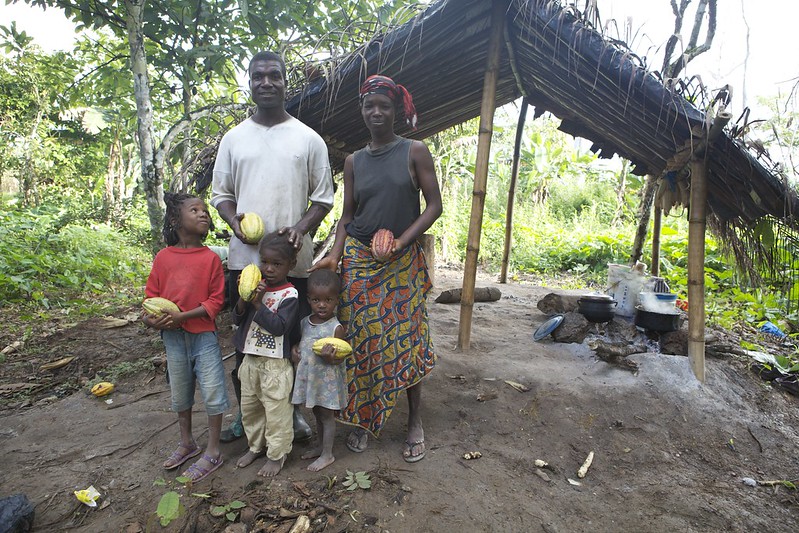
A product of cocoa, “chocolate is one of the most consumed food products” on Earth. According to Make Chocolate Fair, about “70% of the world’s cocoa comes from West Africa.” Despite chocolate’s rising global popularity, there exists an ongoing conflict that casts light on the dark side of cocoa and the plight of West African cocoa farmers.
Rising Prices of Cocoa
Market researchers forecast that the global chocolate market would grow from its $137 billion market size in 2019 to $182 billion by 2025. Cocoa prices also rose on New York’s Intercontinental Exchange (ICE) by 10% between October 2020 and October 2021.
Despite such massive growth, West African farmers may receive lower prices for their cocoa harvest in the upcoming year. In October 2020, chocolate companies were paying West African cocoa producers a price of 1,000 West African francs for a kilogram of cocoa. Today, the per kilogram “minimum guaranteed producer price” equates to 825 West African francs, amounting to just $1.45. The drop in prices could sink farmers into poverty, costing them as much as 20% of their income. The cocoa farmers, however, are taking a stand to protect their livelihoods and avoid the grips of poverty. Nations, groups and individuals are taking action to keep West African cocoa farmers out of poverty.
West African Cocoa Farmers Fight for Change
- Introducing a Living Income Differential (LID). In 2019, the Ivory Coast and Ghana, both of which produce more than 50% of the global cocoa output, introduced a $400 premium to the price per ton of cocoa, known as the Living Income Differential (LID). The LID aims to ensure farmers earn “a living income” by increasing payments to farmers from purchasers.
- Standing Up Against Exploitation with Boycotts and Strikes. In December 2020, more than 500 farming industry leaders gathered in the Ivory Coast to address chocolate giants Hershey and Mars’ alleged attempts at avoiding the $400 LID premium. Farmers are considering moving to cassava farming “if their demands are not met.” In October 2021, the National Association of Ivorian Producers (ANAPROCI), which represents more than half a million cocoa industry members in the Ivory Coast, launched a strike to demand “payment of a 17 billion CFA francs ($29.8 million) premium promised by the government to help farmers to deal with the effects of the COVID-19 pandemic.” In addition, ANAPROCI urges the government to create a formal apparatus to discuss issues impacting farmers. ANAPROCI President Koffi Kanga threatened, “If the government or the [Ivory Coast Cocoa and Coffee Council regulator]does not listen to us, we will block the entire sector in the next few days. We are going to prevent cocoa from reaching the ports by all means.”
- Pursuing Legal Avenues Against Exploitation. West African farmers are pursuing legal avenues against exploitation. A group of six men from the West African nation of Mali filed suit against Nestlé U.S.A. and Cargill, alleging that they were trafficking victims as children, working on cocoa farms in the Ivory Coast. Their complaint alleges that the chocolate companies were complicit in the slave trade in order to “keep cocoa prices low.” Though the Supreme Court found in favor of the chocolate giants in an 8-1 decision, International Rights Advocates intends to file a new lawsuit, “alleging that many decisions made by Nestlé and Cargill in the U.S. helped to pave the way for the use of child slaves in Ivory Coast.”
- Sierra Leone opens “its first cocoa processing factory” in October 2021. The factory will account for a quarter of the country’s yearly production of cocoa — roughly 4,000 tons of cocoa beans annually. The factory will produce a semi-finished product as opposed to the raw materials that Sierra Leone typically produces, which has the potential to increase earnings by 20%. The new facility represents an opportunity for change in the dynamics of the supply chain as critics often emphasize that raw materials sold to industrialized nations tend to reap less profit than finished products.
Looking Forward
West African cocoa farmers are continuing to take action against exploitation within the cocoa industry. Public opinion is also shifting, with a growing demand for chocolate that companies produce with social and environmental sustainability in mind. However, regardless of public opinion or the stance of industry giants, the cocoa farmers of West Africa continue to fight their way out of poverty.
– Richard J. Vieira
Photo: Flickr
The post The Plight of West African Cocoa Farmers appeared first on The Borgen Project.